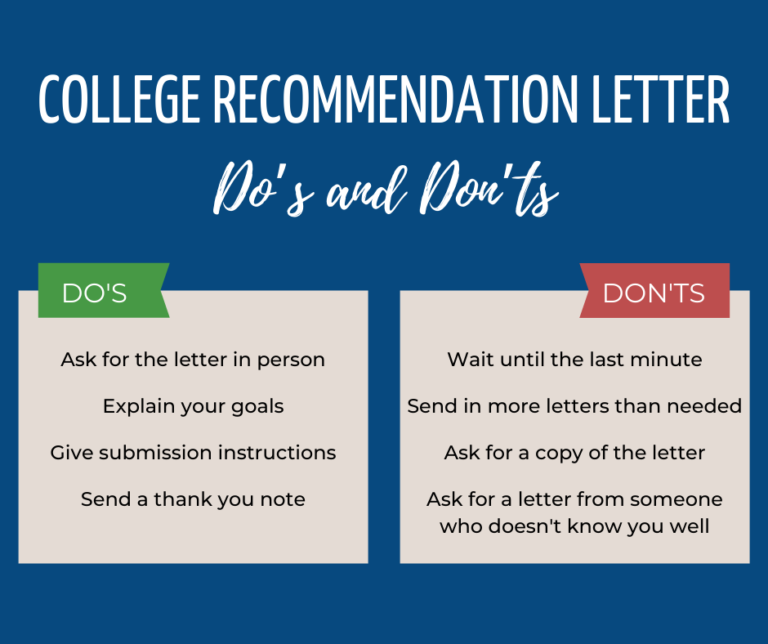9 Steps to Get References for Your College Applications

Grades and test scores are significant and important as you navigate the college application process, but most admission counselors agree that they do not tell the whole story. Most colleges and universities will ask for more than just grades and test scores. As part of their application, they may ask you to include a list of extracurricular activities, volunteer work, an essay, and some references.
While not all colleges or universities ask for references, some do include this question as part of the college applications process to help them evaluate what you are like as a person and a student. You’ll find that when references are requested, you will typically need to provide one to three college recommendation letters.
Reference letters are easier to obtain when you’ve taken the time to build a relationship with those who are helping you on your educational journey. It’s not enough to impress a teacher, coach, or employer. It’s better if they have gotten to know you as an individual and can speak about your personality, goals, motivations, and results.
Do College Recommendation Letters Matter?
The National Association for College Admission Counseling conducts an annual survey of colleges to learn more about their admissions processes. There is no doubt that grades and test scores are the most important factors. But college letters of recommendation play a significant role as well. Among the colleges participating in the survey, about 15% state that both counselor and teacher recommendations, most often in the form of letters of recommendation, are of considerable importance. Another 40% report that these types of letters are of moderate importance.
Who to Ask for College Applications Reference Letters
As a homeschooled student, you may encounter some challenges in getting people to write letters for you. While most typically-schooled students can choose from several teachers or a guidance counselor, you may not have as many people to ask. If you need to include references, but don’t know who to put down, this suggestion list can help you complete your college applications in a way that will help you stand out.
- Teachers
Homeschool students may have fewer teachers than a student in a typical school setting, but you still encounter teachers in many different settings. Co-op teachers, community college instructors, extracurricular teachers, and online instructors are all good people to ask for a college letter of recommendation. - Your Pastor/Parish Priest
As a Catholic homeschooled student, you probably have spent a considerable amount of time at your parish. A priest who knows you is a great reference. This is especially true when you’ve given time and talent in the service of your parish. Other parishioners who know you well or have worked with you on parish volunteer projects can attest to your qualities and strengths. - Employers or Volunteer Coordinators
If you have worked a part-time job during high school, you can ask your employer to be a reference for you. An adult co-worker can also be a good reference. If you’ve worked as a babysitter or lawnmower, ask your clients to be a reference. You can also include a supervisor from a volunteer project you’ve worked on. - Friends and Neighbors
Adults who know you well can be a good reference. Choose someone who has seen your accomplishments in work, academics, service, and extracurriculars. This type of reference can put a personal spin on your talents and successes. - Music/Drama Instructor
If you’ve participated in a play or played an instrument in a community youth orchestra, you can ask your director for a reference. Music teachers get to know their students well, so ask your violin or piano teacher for a reference. - Sports Coaches
If you’ve played sports during high school, your coach can be a great reference. He or she can speak about your teamwork skills, hard work, perseverance, and sportsmanship.
How to Ask for a Letter of Recommendation
It is simple to ask for a letter of recommendation. You can mention it in person or send an email request. One thing to avoid is waiting until the last minute to ask for a letter. Not only is this disrespectful, it may mean that you miss some deadlines. As soon as you know you need one, put out your requests. This will give your writers time to plan and write a thoughtful letter without feeling pressed for time. It also allows them the time to ask you any questions about things they want to include in the letter.
What Should a Letter of Recommendation Say?
You will need to provide your letter writer with some information to help them write a good recommendation letter. This should include:
- The college or university you’re applying to
- Why you are interested in that particular college or program
- How long you’ve known the letter writer
- Information about your grades and other activities
- Awards or achievements you’ve earned in academics, sports, or volunteer activities
- Your work experience or a resume
- Your future goals and plans
- Details about the letter submission process
- The submission deadline
How Are Recommendation Letters Sent into a College or University?
Most colleges and universities have specific procedures to submit recommendation letters. They could have a portal or webpage to upload a digital copy, they may ask for a letter to be emailed, or some may accept a snail-mail letter. Find out ahead of time how the letter is to be submitted and communicate those instructions clearly to your letter writers.
Don’t be surprised if you never see the letters of recommendation that are sent in. In many cases, the schools may request that the letter be sent to them directly, rather than going through you. This helps preserve the integrity of the process and allows the letter writer to be honest without worrying about hurting your feelings if they cannot give a sincerely positive recommendation.
You may find that your letter writers offer to share their letters with you. That is just fine and can give you insight into how you are viewed by those around you. This is a nice perk, but doesn’t happen in all instances. If you do get to see the letter, make a copy for your records.
Don’t Forget to Thank Your References
Thanking your reference letter writers is just basic good manners. Once you know that your letter writer has sent the reference off, thank them via handwritten letter or note, email, or in person. It is a nice touch to update them once you’ve been accepted and have chosen the college you’ll be attending. It is always nice to know that your contribution has made a difference, and sharing your good news is a great way to show your appreciation for their help.
When You End Up Writing the Letter Yourself
Finally, you may encounter a letter writer who asks you to put together a draft letter that they can modify and sign. This is a common and accepted practice. You can write a draft, listing your accomplishments. You will need to include a description of your good qualities, virtues, and personality. If that feels difficult or awkward, ask a trusted friend or family member to share their impression of you and include that in your letter.

College Recommendation Letter Do’s
- Do choose someone who knows you well, such as an employer, coach, teacher, or family friend. Someone who knows you can write a more sincere and personal letter.
- Do ask in person if possible. Asking in person is not only more respectful. It also lets your letter writer ask you questions before they begin. If you cannot ask in person, you can call or send an email or letter request.
- Do explain that you need the letter for a college application and not for a job application. Although they are similar in some respects, a letter for a college will focus more on your academic accomplishments than an employment recommendation letter.
- Do give some information about your accomplishments and goals. Share your plans for your future with your letter writer to allow them to include that in the letter.
- Do share the specific details about how to submit the letter. Give clear and complete instructions so that the letter reaches the university in the correct manner and on time.
- Do send a thank you note afterwards. Express your gratitude for their help in the application process. And if you ever have the chance to write a letter for someone in the future, remember to be patient and generous in granting those requests.
College Recommendation Letter Don’ts
- Don’t wait until the last minute. Make your request as soon as you know you need the letter. Be clear about the deadline for the letter as well.
- Don’t send in more letters than are needed in your college applications. Drowning the application committee in extra letters will not help you gain admission.
- Don’t request a copy of the letter, either before or after submission. Of course, if a copy is offered to you, then you can accept it. But don’t pressure your letter writer into sharing the letter if they don’t feel comfortable. If you are worried about what a letter writer might say, then you should probably choose someone else to write it for you.
- Don’t ask for a letter from someone who doesn’t know you. If you happen to know a notable or influential person, unless they know you very well, don’t go to them for a letter of recommendation. What you may receive, if you receive anything at all, is a vague generic letter. This can hurt rather than help your application.

